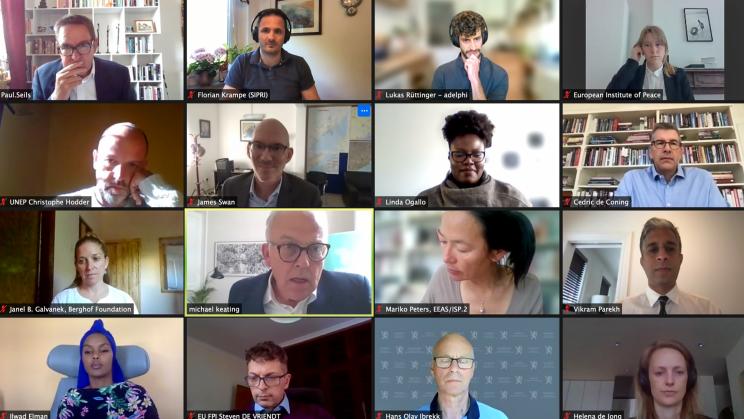
As part of the ‘Climate-related Peace and Security Risks’ project, SIPRI co-hosted a virtual expert-level dialogue on ‘Integrating Climate Security and Peacemaking in Somalia’ on 2 June.
The discussion assessed the integration of climate security into Somalia’s peacebuilding efforts one year after the first Climate Security Advisor to a United Nations mission took up the role within the UN Assistance Mission to Somalia (UNSOM). The event brought together a select group of Somali peacemakers, policy makers, UN staff and international experts.
The webinar opened with remarks by James Swan, Special Representative to the Secretary-General (SRSG) to Somalia and head of UNSOM, and Michael Keating, Executive Director, European Institute of Peace (EIP) and former SRSG to Somalia. Presentations were held by Ilwad Elman, Chief Operating Officer, Elman Peace Centre (EPC), and expert panellist of SIPRI’s Environment of Peace initiative, and Christophe Hodder, Environmental Security Adviser, UNSOM.
The subsequent discussion focused on assessing the integration of climate security into Somali peacebuilding efforts, with a panel including: Director-General Ahmed Nur Yusuf, Directorate for Environment and Climate Change, Office of the Prime Minister, Federal Government of Somalia; Vikram Parekh, Senior Political Affairs Officer, UNSOM; Linda Ogallo, Climate Change and Adaptation Expert, Intergovernmental Authority on Development; and Florian Krampe, Director, Climate Change and Risk Programme, SIPRI.
The expert dialogue was organized by the EIP, the EPC and UNSOM with support from adelphi, the Norwegian Institute of International Affairs (NUPI) and SIPRI.
About the Climate–related Peace and Security Risks project
The project aims to generate reliable, relevant, timely and actionable information and analysis on climate-related security and development risks for selected countries and regions on the UN Security Council agenda. The research is aimed at backstopping the work of Norway during its period as an elected member of the Security Council. The project is funded by the Norwegian Ministry of Foreign Affairs between 2020 and 2023.
Read more about the project here.